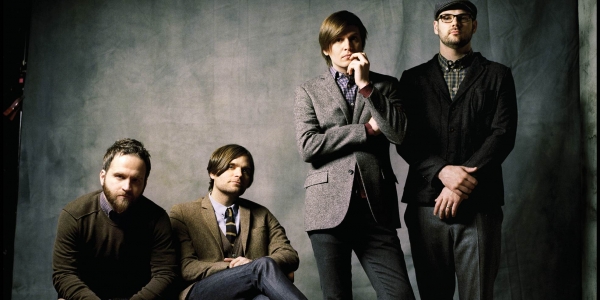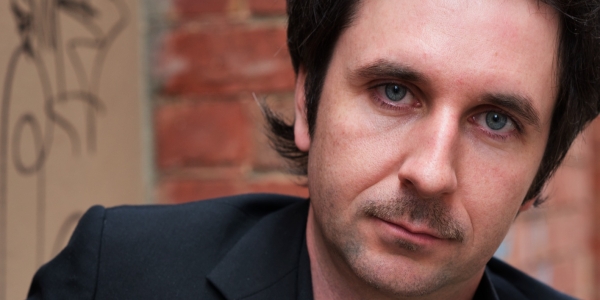However, drummer Jason McGerr doesn’t actually realise the extent of his band’s reach until he’s confronted by it. “You know, today when I went to the sandwich shop, the guy didn’t take my order right away; he froze up and asked if I was who I was and in the band that I was in… and he said, ‘can I please buy you a sandwich?’ I said, ‘…..sure!'” chuckles McGerr, seemingly still flattered and even a little uncomfortable. “I still feel like I’m a little guy in a little band from a little town.”
Indeed, unlike most world-touring bands, Death Cab For Cutie don’t feel like successful musicians … as McGerr insists, they’re just little guys making (grand) music.
“The only thing that ever indicated that we have a bigger audience and career is when we’re having to book things out six to eight months in advance,” states McGerr, “and I’m doing interviews with a country that’s an 18 hour flight away, like yourself (the band are currently planning an Australian tour: “I don’t know if it’ll be before the end of this year or this time next year, but we’ll see you soon”).
“But none of us really think about the fact that much has changed since the early days, other than the fact that we get to ride in a nicer bus… or just a bus in general,” he laughs, “and we get to make records however we want whenever we want; so we’re very fortunate to be able to do what we do.”
Across their first three albums, Death Cab For Cutie garnered a strong following through their emotionally-potent songwriting, but it was the group’s fourth album, Transatlanticism – the first to feature McGerr (the band’s third drummer) – that would cement their significance, with several critics naming the record as one of the past decade’s finest albums.
Along with increased press coverage, Transatlanticism would garner a degree of commercial appeal that would lead to a major label deal with Atlantic Records (who offered the most artistic freedom of all the major labels) with the release of their fifth album, Plans. Its follow-up Narrow Stairs was the band’s darkest and most experimental release, but their seventh album, Codes And Keys, may be the quartet’s most beautifully-explorative record.
A cohesive album of impressive sonic and emotional scope, Codes And Keys embarks on a journey through entrancing atmospherics (Home Is A Fire, Doors Unlocked And Open,Unobstructed Views), soaring orchestral grandeur (Codes And Keys,St. Peter’s Cathedral; Stay Young, Go Dancing), stirring emotional poignancy (Some Boys) and hook-laden pop classicism (You Are A Tourist, Monday Morning, Portable Television, Underneath The Sycamore).
Codes And Keys is a unique, brilliantly-crafted record that ties in themes of displacement, self-discovery and finding one’s home and inner peace.
“It’s funny how we all kind of arrived at this title at the same time – Ben (Gibbard – vocals, guitar, piano) and Chris (Walla – guitar, production) were recording; they were doing vocals towards the end of the project, and Nick (Harmer – bass) had just gotten off the plane and I was at home,” McGerr recalls.
“We were checking out ideas for album titles and I think all of us were thinking about Codes And Keys because of how much it had to do with all the themes in the record. It was Ben and Chris who decided first that that’s what it should be and they texted Nick and I at the same time, and we both wrote back: ‘of course!’
“It meant a lot not only in the context of the themes of the record being a lot about looking for a home and defining what that is, but because we travel so much, we have a lot of different meanings for home. It seems like all of us need to enter some kind of a code or key to access that home whether it’s a physical key or a number key to get into a gate, to set up an alarm or voicemail – we all have to interface with those codes and keys.
“And also, there’s an emotional code to unlocking where you consider home to be, and sometimes it’s not always apparent and you need to search for it.”
Recently, monumental personal changes took place within the band: Gibbard and Harmer married their partners and McGerr’s wife gave birth to their second child. The past few years have marked a profound period in the lives of the band members. “Yeah, I mean the songs that were written for Narrow Stairs were mostly written while we were on tour and it was a long tour,” McGerr emphasises.
“Transatlanticism through to Plans was like one big run – we were living on the road and it was difficult to maintain relationships, because there wasn’t one place that you called home. A lot more stability was able to be in place while we were writing for Codes And Keys.
“I think, overall, it’s a more positive record because all of us are in a more positive place but outside of the band, what happens in our personal lives – whether it’s finding a house or having more children – those things just truly confirm what the band means to us all.
“Because we get to have both of those things – I can be in a band that can travel around the world and make music for people, and I can have a couple of children and have a wonderful life at home with a family that’s patient enough to let me do my thing. It’s the same with Ben – he has more understanding and order in his life now while also being creative – it’d be funny if we wrote lyrics and music that was really melancholy and sad this time; people would wonder what’s wrong,” he chuckles.
Codes And Keys is also a distinctive album in that it was the first time they gave someone other than a band member (Walla had produced and mixed all their previous albums) the mixing reins – that someone was none other than legendary English producer, Alan Moulder.
“I think it’s by far our best sounding record,” states McGerr, “because we went to great lengths to re-record so many details and nuances in so many studios. I’m glad that someone like Alan was able to make room for all those nuances.”
You Are A Tourist – the first single from Codes And Keys – features the pertinent lyric of “If you feel like a tourist in the city you were born / Then it’s time to go and define your destination / There’s so many different places to call home”. “You Are A Tourist was one of the last songs we recorded, but it came together extraordinarily fast, because we were just so excited about it,” McGerr asserts.
“We had been listening to it as a demo for so long. It really resonated with all of us lyrically, because of all the travel that we do, you know – we’ve moved around a bunch, all of us individually in the last four or five years. You continue to come home to the same place and you no longer share things in common with the people that have been there all along, and really you’ve been gone eight to ten months out of a year.
“So you no longer call it home, and that’s kind of the idea behind the song – you feel like a tourist; that you’re just passing through. I feel like a lot of people can relate to travelling, and even those who don’t may find that they’re not really feeling like they’re in the right place.”
The video for You Are A Tourist made history by becoming the first-ever live, scripted, single-take music video to be broadcast world-wide during its filming. The idea was suggested by the band’s long-time friend/collaborator, Aaron Stewart-Ahn (who also worked on the video for I Will Possess Your Heart), and award-winning filmmaker, Tim Nackashi. “Aaron came up with the idea that no one had ever really recorded a video that went out live to the world as it was being done, and then Tim made it seem so dangerous and fun that if anything went wrong, it would be charming,” he chortles.
“Having dancers in the video and all these extra characters took a lot of weight off us to not have to do chiefly a performance-based video.
“45 minutes before we were about to go live to the world, there were some problems with the feed and we weren’t entirely sure if it was going to hold up,” McGerr relates. “When we went live, the dancers’ costumes were starting to become unravelled, so people were worried and there was this sense of danger. There was a countdown like it was a space shuttle launch or something,” he chuckles.
“We really worked hard three days straight building the set – it kind of looked like a variety show with an improvisational look to it. I think it came across really charming – it made for a really unique video or a one-of-a-kind one.”

